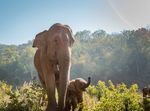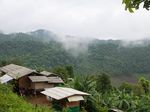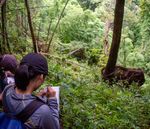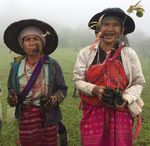Field Course 2020 Asian Elephants: Animal Behavior and Wildlife Conservation in Thailand - Center for the Integrative ...
←
→
Page content transcription
If your browser does not render page correctly, please read the page content below
Announcing: The Institute for Compassionate Conservation, in
partnership with Mahouts Elephant Foundation:
Field Course 2020
Asian Elephants: Animal Behavior and Wildlife
Conservation in Thailand
Applications Now Open!
(rolling admission, final deadline is February 1)Coursework:
This program is a once-in- The Asian Elephant Compassionate Conservation field
course explores how the science of animal behavior
a-lifetime opportunity for and well-being can be used in conservation, to improve
qualified students to study outcomes for animals, people and the environment.
Asian elephants in their Compassionate Conservation is an emerging cross-
disciplinary scientific field, that recognizes that the health
natural habitat in their
and wellbeing of all living things – including humans – are
range country. connected.
For this field course, each student will have his or her
own research project, as part of an ongoing research
collaboration between ICC and MEF, that is studying the
behavior, social dynamics, bioacoustics and foraging
ecology of a family rewilded Asian elephants. To collect
the data for their projects, students will hike into bamboo
and tropical evergreen forest to observe the elephants.
Students will be accompanied by trained staff and
elephant guardians when hiking out to the elephants.
Besides gaining field work experience, this course
addresses the socio-cultural context of conservation.
Students will explore the complexities and challenges of
community-based conservation, and will be immersed
in cultural experiences. Students will also gain language
skills in S’gaw Karen and Thai, through formal lessons by
our bi- and tri-lingual field staff, and by conversing with
community members.
Life in the Field:
Students will be accommodated in homestays by the
local village. The field site is in a remote (but not isolated)
Karen hill tribe village in northern Thailand. The villagers
speak Karen and Thai. The accommodations are basic,
but clean and comfortable. Toilets are mostly western, but
some are Asian squat style. The showers are a traditional
bucket bath. There is no running hot water in the village.
Additional Trips:
Students will have a weekend in the middle of the
course to explore Chiang Mai, the largest city in northern
Thailand. Chiang Mai is renowned for its night markets,
beautiful Old City region, and delicious, traditional Thai
cuisine. It is an extremely safe and easy to navigate
city. Transportation to and from Chiang Mai is included
in the course fee, but student’s choice of activities and
accommodation in Chiang Mai during their break is their
responsibility.Elephant Field Research:
ICC and MEF collaborate on a long-term research program to study
how re-wilded elephants live in the forest. This research is the first of its
kind on Asian elephants and is a vital, compassionate step forward. Our
research will advance the scientific community’s ability to conserve and
protect Asian elephants worldwide. Accepted field course students will
participate in this research program.
Expert Course Instruction:
Course Instructor: Liv Baker Phd. Msc.
Dr Liv Baker works with Mahouts Elephant Foundation, directing their
research program. Dr. Baker is a conservation behaviorist and an expert
in wild animal well-being. Her research focuses on the role individual,
wild animals have in the health of their social groups and populations. “I attended this study abroad
Dr Baker’s work explores the similar patterns of well-being and behavior program in August of 2018 and
seen across the animal kingdom. Dr Baker’s conservation research it was the best experience of
projects involve a range of wild animals, including, elephants, primates, my life! If you are thinking of
arachnids, rodents, and macropods. Dr. Baker is a faculty member at attending this program I highly
Hunter College, New York in their Animal Behavior and Conservation recommend it was the best
Program. decision I ever made and it
meant a lot to me.”
Dr. Baker will assist students with preparation for their field study and will - Danielle, 2018 Participant
join students for the first week of their field experience, providing on-
site lectures and research guidance. After which, students will be led by
MEF’s Research Coordinator Becca Winkler and their expert field staff.
Course Assistant: Mara van Maarschalkerweerd, MSc
Mara van Maarschalkerweerd joined the MEF research program for the
graduation project of her second masters in Behavioural Ecology in 2018.
This research project focussed on the assessment of the elephants’
wildness, as part of their well-being, at multiple project sites. She
continued working on the research program after graduation and returned
to study the latest elephant that MEF supports at the LIFE project site. At
home in the Netherlands, Mara works as an Equine veterinarian.
MEF Founder and CEO Sarah Blaine will also be working directly with
course participants. Sarah Blaine has been working for over a decade
“This experience will greatly
to reform the elephant tourism industry. She works internationally with
influence my educational/
industry stakeholders and will provide students with valuable insight into
career path. It solidified that
the complexities and challenges of creating lasting change for elephants
I would like to do field re-
and mahouts. Students will also be joined by MEF’s experienced field
search, to some degree, as a
staff
profession.”
- 2019 Participant
Why Field Experience?
There are hundreds of valuable summer experiences for students, but “I learned so much about ele-
engaging in field research with real-world application provides invaluable phant behavior and conserva-
experience for students helping them to bridge the gap between theory tion from the perspective of
and practice. We keep numbers small enabling personalized learning, scientists/staff, as well as the
tailored to each student’s individual research interests. For anyone community around them. I
interested in a future career in the fields of biology, ecology, conservation, learned brand new methods
animal behavior or animal welfare, fieldwork is a necessary part of for observing and recording
learning and professional development. Field research is something that the elephants behaviours.”
all graduate programs look for in candidates. - 2019 ParticipantProgram Details
Contact Information
Eligibility and Requirements: All students in their 2nd Main Contact: Course Assistant,
year, or above, of an undergraduate/Bachelor’s degree in a Mara van Maarschalkerweerd, MSc
related discipline are welcome to apply. mahoutsfoundation@gmail.com
In addition to completing the 4-week course, to earn credit
from your home institution, students must complete a Curriculum Questions Contact:
final research project based on on-site lectures, and data Dr. Liv Baker
collection. Dowload the applicaiton here Executive Director, ICC; program
or email mahoutsfoundation@gmail.com for application
facilitator and research director,
details.
Hunter College, CUNY
Program Length and Dates: The ICC/MEF Field Course Lv824@hunter.cuny.edu
involves 4 weeks of dedicated field time, approx. 2 weeks of
pre-field preparatory work, and approx. 2 weeks of post-field Submit Applications
individual work to complete each students research project. Electronically to:
iccfieldcourseapps@gmail.com
Fieldwork in Thailand: July 26 – August 22
Pre-Field Readings and syllabus distributed upon final
payment, reading assignments due July 15-August 2
Post-Field: Final Project due September 30
Costs: Total Cost $ 2,900*
Nonrefundable deposit of $ 400.00 due by April 15 to
reserve your place
Program Fee of $ 2,500.00 due by May 15
Program Fee Includes:
• Field Course tuition and instruction from Dr. Baker plus
field guidance by TA Mara van Maarschalkerweerd and
MEF Field Staff.
• Pre-trip field orientation communication
• On-site accommodations and meals (3x/day)
• Program-related travel (ground transportation)
• On-site lectures and cultural immersion activities
• On-site translators in the field and language lessons
• Overnight camping trips
Program Fee Does Not Include
• Student’s own additional University Tuition (If
applicable for receiving credit)
• Airfare
• Travel Health Insurance (required)
• Cellular Data – MEF recommends students purchase
international data
• Incidentals, for example: Personal transportation
not related to the program, additional meals, off
site accommodations, personal spending money,
immunizations (if needed), health or travel insurance,
visas (if necessary).
Recieving University Credit: Field Course participants can
acquire credit directly from their home universities. Students
should contact their department or academic advisor and
make sure to inform ICC staff of necessary materials they
need to receive credit prior to making their final payment.
*Program fee based on Nov. 2019 exchange rates from THB, and is subject to
change of up to 5% based on exchange rate fluctuations.About Mahouts Elephant Foundation In addition to working with animal behaviourists, conservationists, and ecologists, participating students will work closely with the team from Mahouts Elephant Foundation, a not-for-profit organization dedicated to improving the lives of Asian elephants and the people who coexist with them. MEF started the re-wilding project “Walking Elephants Home” in 2015 to re-wild a family of elephants, rescued from working and performing in the elephant tourism industry. MEF helps provide financial stability to local people, through a safari-style ecotourism model that guides visitors into elephant habitat, where they may observe the elephants free living in the forest. Accepted students to the program will be guests of MEF and are expected to comport themselves with professionalism, respect, and cultural awareness in the village. It is imperative to our project that all guests respect the differences in culture and strive to understand the community we work alongside with openness and compassion. More information about the project can be found at the Mahouts Elephant Foundation Website www.mahouts.org About the Institute for Compassionate Conservation The Institute for Compassionate Conservation is a multi-institutional organization with the mission of supporting the well-being of wild animals through compassion, science, and scholar advocacy. ICC holds that like us, all animals have an interest in the outcomes of their lives. All animals want appropriate shelter, safety, and food; they want to learn about and hold sway over their lives. For all animals - just like us - their physical health is intertwined with their psychological health; and their social environment matters. Reasonable challenges and positive emotions are not mere privileges an animal is fortunate enough to experience, but are essential to them being alive. ICC www.compassionateconservationinstitute.org worls closely with the Centre for Compassionate Conservation and Compassionate Conservation Middle East.
You can also read



























































